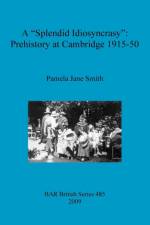von Pamela Jane Smith
129,00 €
It is often assumed that, in Britain, archaeology has always been a university-inspired course. However, the identification of qualified scientific archaeology with a formal education is a twentieth-century phenomenon. Archaeology as a waged, educated, vocational pursuit is a recent development. At the beginning of the twentieth century, there were no degree courses in archaeology, no profession or professionals, no formal controls over recruitment, nor institutionalised avenues of entry, nor established examination-based qualifying standards, certainly no faculties, textbooks, lectures, practicals, nor archaeological libraries. British universities have produced great lineages of descendants who practise archaeological specialisations the world over. Yet, it is not known why or how archaeology became a university option. There are no specific histories of how archaeology was institutionalised as a university degree subject in Great Britain and Eire. The entire history of all twentieth-century archaeologies, not just prehistoric, but classical, Romano-British, Anglo-Saxon, mediaeval and historic, can be viewed through the lens of amateur versus university professional and how these terms became defined and used. A university-based group emerged during the twentieth century, whose members gainfully asserted that anyone who was not university centred, or at least university-trained, was an amateur. It is widely accepted today that if you do not have a degree you are not a professional archaeologist. How did this happen? Who considered themselves professionals? Who preferred to be defined as amateur and how did the self-identity of archaeologists change? This work focuses on one small crucial beginning of this fascinating evolutionary process. It is the first history of its kind and is intended to be a block for the building of a broader informed history of British academic archaeology. It will hopefully set an example for other historians of archaeological institutions to follow.

